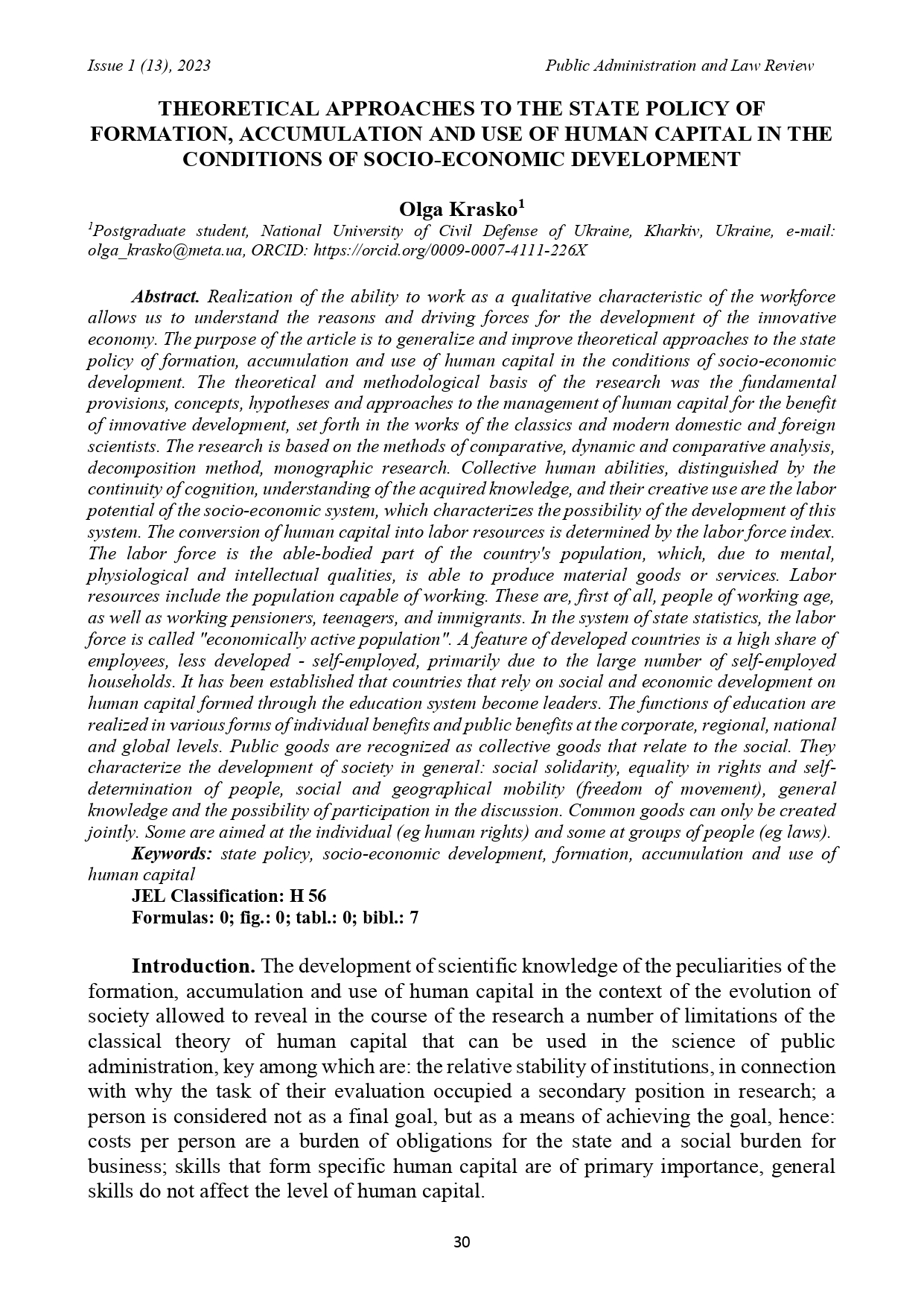THEORETICAL APPROACHES TO THE STATE POLICY OF FORMATION, ACCUMULATION AND USE OF HUMAN CAPITAL IN THE CONDITIONS OF SOCIO-ECONOMIC DEVELOPMENT
DOI:
https://doi.org/10.36690/2674-5216-2023-1-30Keywords:
state policy, socio-economic development, formation, accumulation and use of human capitalAbstract
Realization of the ability to work as a qualitative characteristic of the workforce allows us to understand the reasons and driving forces for the development of the innovative economy. The purpose of the article is to generalize and improve theoretical approaches to the state policy of formation, accumulation and use of human capital in the conditions of socio-economic development. The theoretical and methodological basis of the research was the fundamental provisions, concepts, hypotheses and approaches to the management of human capital for the benefit of innovative development, set forth in the works of the classics and modern domestic and foreign scientists. The research is based on the methods of comparative, dynamic and comparative analysis, decomposition method, monographic research. Collective human abilities, distinguished by the continuity of cognition, understanding of the acquired knowledge, and their creative use are the labor potential of the socio-economic system, which characterizes the possibility of the development of this system. The conversion of human capital into labor resources is determined by the labor force index. The labor force is the able-bodied part of the country's population, which, due to mental, physiological and intellectual qualities, is able to produce material goods or services. Labor resources include the population capable of working. These are, first of all, people of working age, as well as working pensioners, teenagers, and immigrants. In the system of state statistics, the labor force is called "economically active population". A feature of developed countries is a high share of employees, less developed - self-employed, primarily due to the large number of self-employed households. It has been established that countries that rely on social and economic development on human capital formed through the education system become leaders. The functions of education are realized in various forms of individual benefits and public benefits at the corporate, regional, national and global levels. Public goods are recognized as collective goods that relate to the social. They characterize the development of society in general: social solidarity, equality in rights and self-determination of people, social and geographical mobility (freedom of movement), general knowledge and the possibility of participation in the discussion. Common goods can only be created jointly. Some are aimed at the individual (eg human rights) and some at groups of people (eg laws).
Downloads
References
Ryabchuk, O. H., Hozhulovsʹkyy, S. S. (2020) Peculiarities of the development of human capital as the main factor in the growth of the economy of Ukraine, Ekonomichnyy visnyk. Seriya: finansy, oblik, opodatkuvannya, Vol. 4, pp. 182-192.
Hynda, S.M., Hynda, O.M. (2017) Human capital: essence, features of analysis and evaluation, Ekonomika i suspilʹstvo, Vol. 12 , pp. 73-78.
Sen, A. (2004) Development as freedom, Novoye izdatel'stvo, Moscow, RF.
Ukrstat (2022). Demographic and social policy. URL: https://www.ukrstat.gov.ua/operativ/operativ2017/rp/eans/eans_u/arch_eansmv_u.htm
OKR (2022). The Changing Wealth of Nations 2018: Building a Sustainable Future. URL: https://openknowledge.worldbank.org/handle/10986/29001
Hanushek, Eric A., Woessmann, L. (2008) The Role of Cognitive Skills in Economic Development, Journal of Economic Literature, № 46 (3), pp. 607-608.
2017 Deloitte Global Human Capital Trends. Р. 4. URL: https://www2.deloitte.com/insights/us/en/focus/human-capital-trends/2017/introduction.html

Downloads
Published
How to Cite
Issue
Section
License

This work is licensed under a Creative Commons Attribution-NoDerivatives 4.0 International License.





